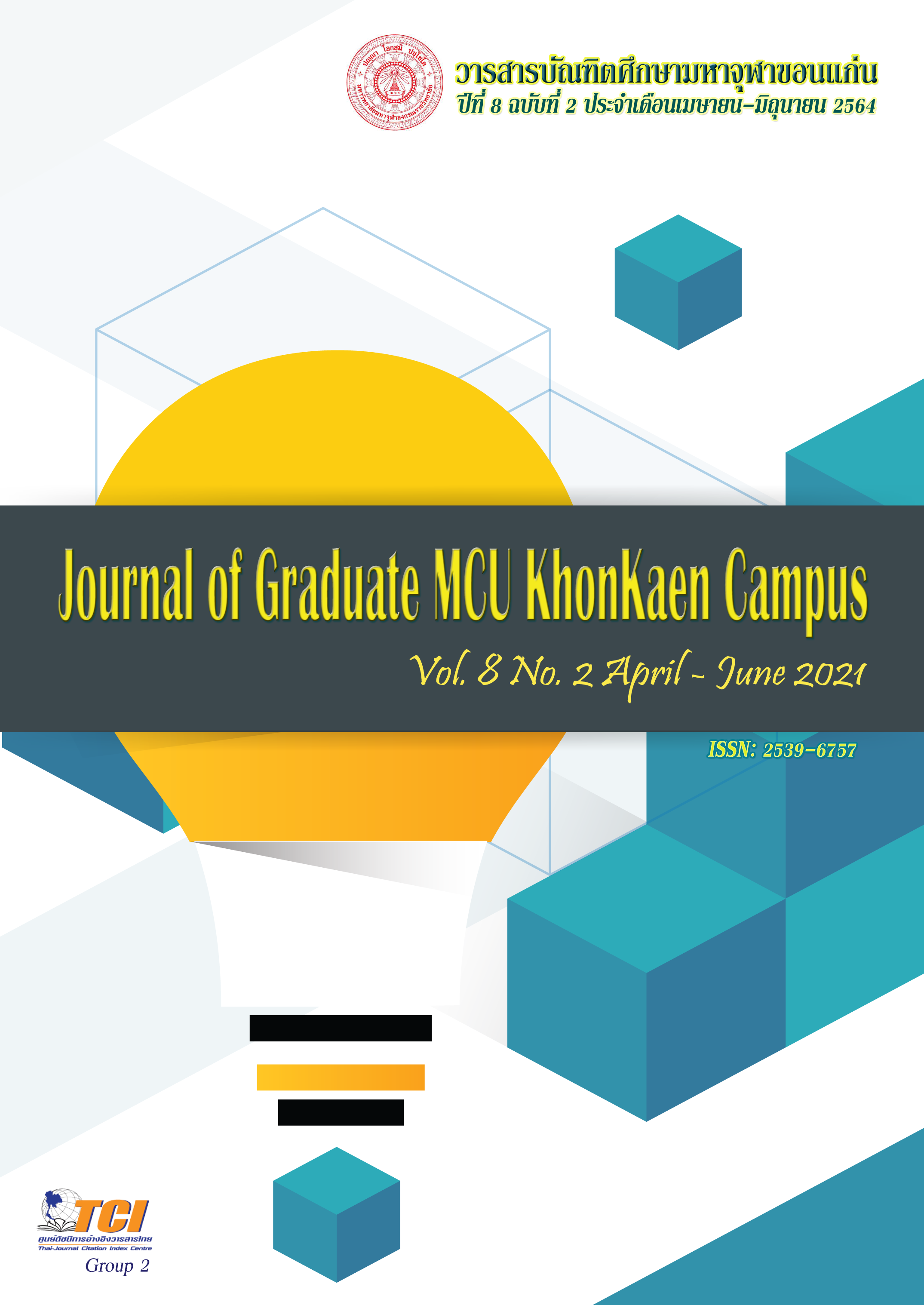THE EFFECT OF THE DEVELOPMENT OF HYPERTENSION SELF-CARE PROGRAM IN OLDER PERSONS WITH HYPERTENSION
Main Article Content
Abstract
This quasi-experimental research aimed to compare the health behavior to control the blood pressure in older persons with hypertension before and after receiving the Develop care of Hypertension Program, and to compare level of blood pressure in older persons with hypertension between the experimental group and control group.
The subjects were 44 older persons, who lived in Phrae Municipality, Phrae Province more than 1 year from 2019. They were divided into 2 groups: 22 persons in each group by purposive sampling. The instruments was approved by 3 experts, obtaining a CVI of 1, and acceptable reliability at .82. The control group received conventional nursing care while the experimental group received the Develop care of Hypertension Program for twelve weeks. The data were analyzed using descriptive and t-test statistics.
The results are summarized as follows:
1. The mean score of health behavior to control the blood pressure in older persons after received the Develop care of Hypertension Program was significantly higher than before received program which referring better health behavior to control the blood pressure.(p < .05)
2. The mean score of health behavior to control the blood pressure in older persons experimental group after received the Develop care of Hypertension Program was significantly higher than Control Group, before received program which referring better health behavior to control the blood pressure.(p < .05)
3. The mean score of level of blood pressure in older persons with hypertension after received the Develop care of Hypertension Program was significantly lower than the subject receiving conventional care which referring better level of blood pressure. (p < .05)
4. The mean score of level of blood pressure in older persons with hypertension after received the Develop care of Hypertension Program was significantly lower than Control Group, receiving conventional care which referring better level of blood pressure. (p < .05)
The Develop care of Hypertension Program allows the Older person to learn, understand and apply to change behavior and perform activities continuously, resulting in the ability to control the blood pressure of the older person with hypertension.
Article Details
References
กรมกิจการผู้สูงอายุ (2562). สถิติผู้สูงอายุของประเทศไทย 77 จังหวัด. สืบค้นเมื่อ 6 มิถุนายน 2563,
จาก http://www.dop.go.th/th/know/side/1/1/275.
กรมควบคุมโรค สำนักโรคไม่ติดต่อ (2560). รายงานประจำปี 2560 สำนักโรคไม่ติดต่อ. สืบค้นเมื่อ 6 มิถุนาน 2563,
จาก http://www.thaincd.com/2016/mediadetail.php?id=12986&tid=30&gid
กุลวดี โรจน์ไพศาลกิจ, สมใจ นกดี และอาภรณ์ สิงห์ชาดา. (2559). ผลของโปรแกรมการจัดการความเครียดต่อความเครียดของ
ผู้สูงอายุ. มหาวิทยาลัยหัวเฉียววิชาการ, 19(38), 49-54.
จิระภา ขำพิสุทธิ์. (2561). ความฉลาดทางสุขภาพ และพฤติกรรมสร้างเสริมสุขภาพของนิสิต มหาวิทยาลัยนเรศวร. วารสารการวัดผล
การศึกษา มหาวิทยาลัยมหาสารคาม, 24(1), 67-78.
นิตยาทิพย์ แสนแดง และชื่นจิตร โพธิศัพท์สุข. (2561). ผลของโปรแกรมส่งเสริมพฤติกรรมการใช้ยาในผู้สูงอายุโรคไม่ติดต่อเรื้อรัง
อำเภอเขมราฐจังหวัดอุบลราชธานี. วารสารการพยาบาลและการดูแลสุขภาพ, 36(3), 33-41.
นัยต์ชนก ถิ่นจะนะ. (2559). ผลของโปรแกรมส่งเสริมการออกกำลังกายที่บ้านโดยใช้ยางยืดต่อสมรรถภาพทางกายของผู้สูงอายุ.
ใน วิทยานิพนธ์หลักสูตรปริญญาพยาบาลศาสตรมหาบัณฑิต, สาขาวิชาการพยาบาลเวชปฏิบัติชุมชน: มหาวิทยาลัยสงขลา
นครินทร์.
ปาณิสรา ส่งวัฒนายุทธ และคณะ. (2559). การพัฒนาโปรแกรมการส่งเสริมสุขภาพในกลุ่มเสี่ยงความดันโลหิตสูงในชุมชนหนองพลับ
จังหวัดเพชรบุรี. วารสารวิทยาลัยพยาบาลบรมราชชนนี กรุงเทพ, 32(2), 115-118.
ไพโรจน์ มะกล่ำดำ. (2558). ผลของโปรแกรมการส่งเสริมพฤติกรรมการดูแลตนเองของผู้สูงอายุที่ป่วยด้วย โรคความดันโลหิตสูง.
วารสารวิจัยราชภัฎพระนคร สาขาวิทยาศาสตร์และเทคโนโลยี, 10(1), 20-39.
มูลนิธิสถาบันวิจัยและพัฒนาผู้สูงอายุไทย. (2560). สถานการณผูสูงอายุไทย พ.ศ. 2560. นนทบุรี: โรงพิมพ์เอพลัสมีเดีย.
วิภาภรณ์ วังวรตระกูล. (2560). ปัจจัยทำนายการรับประทานยาอย่างสม่ำเสมอต่อเนื่องในผู้ป่วยความดันโลหิตสูงชนิดไม่ทราบสาเหตุ.
วารสารพยาบาลทหารบก, 18(1), 131-139.
วัชราพร เชยสุวรรณ. (2560). ความรอบรู้ด้านสุขภาพ : แนวคิดและการประยุกต์สู่การปฏิบัติการพยาบาล.วารสารแพทย์นาวี, 44(3),
-197.
แสงเดือน กิ่งแก้ว และนุสรา ประเสริฐศรี. (2558). ความสัมพันธ์ระหว่างความฉลาดทางสุขภาพและพฤติกรรมสุขภาพของผู้สูงอายุ
ที่เป็นโรคเรื้อรังหลายโรค. วารสารพยาบาลกระทรวงสาธารณสุข, 25(3), 43-54.
Monica K. L. and Vladimir V. M.. (2016). Hypertension and physical exercise : The role of oxidative stress.
Madicina, 52(1), 19-27.
Seyedeh A. M., Jamileh A. I., Fatemeh and Loke S. C. (2018). Effi cacy of Elastic Resistance Training Program
for the Institutionalized Elderly. Topics in Geriatric Rehabilitation, 34(2), 105-111.
Solomon W. A., Tesfay M. A. and Tigestu A. D.(2018). Antihypertensive medication adherence and associated
factors among adult hypertensive patients at Jimma University Specialized Hospital, southwest Ethiopia.
BioMed Central Research Notes, 11(27), 1-8.

